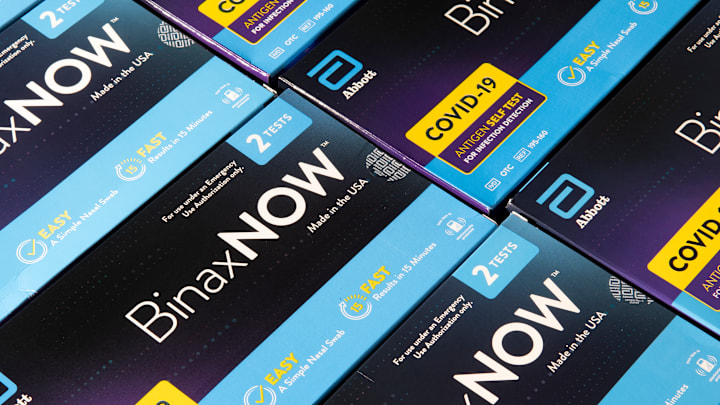With summer coming to an end and more people spending time indoors, there’s usually an uptick in communicable illnesses like colds, the flu, and the headline-grabbing COVID-19. A number of people were testing for the latter on a routine basis a year or two ago, and many may still have at-home COVID-19 test kits they’ll be tempted to pull out if symptoms strike. Depending on how long it’s been sitting in a drawyer, you might be better off getting some new ones, right?
Not necessarily.
According to The New York Times, the rapid test kits that look for antigens typically carry expiration dates. While they certainly can’t cause harm, using an expired test may give you an unreliable result as well as a false sense of security. That’s because the expiration date indicates the end of the test’s expected shelf life at the time of manufacturing.
But there’s a caveat. According to the U.S. Food and Drug Administration, some COVID-19 test manufacturers are extending the shelf life of their tests. That means that since the tests were first produced, the product has demonstrated efficacy for longer than anticipated. As a result, companies can update the expiration date, even if the test was already distributed.
Say a test manufactured in January 2022 had an expiration date of January 2023. The kit could be observed to see if its contents degraded after that date. If not, its shelf life can be extended.
To find out if the test you have might be good past its original date, you can check the FDA’s website. (If you can’t find your specific test, or it’s marked as “check box label,” assume it’s expired.)
You should test for COVID-19 if you have symptoms, or if you’ve been exposed to someone known to be infected. With the latter, it’s best to wait five days before testing to avoid a false-negative result. The FDA also recommends repeating a negative test in 48 hours, as antigen tests are not as accurate as physician-administered tests.
If the test is still shelf-stable, make sure to check that the “Control” line on the product still appears. If it doesn’t, discard the test and get another one.
While the U.S. government is not currently offering free test kits in the mail, a number of local health departments and pharmacy chains offer free in-person testing. A new vaccine booster shot targeting the XBB.1.5 variant is expected to be widely available this month.
